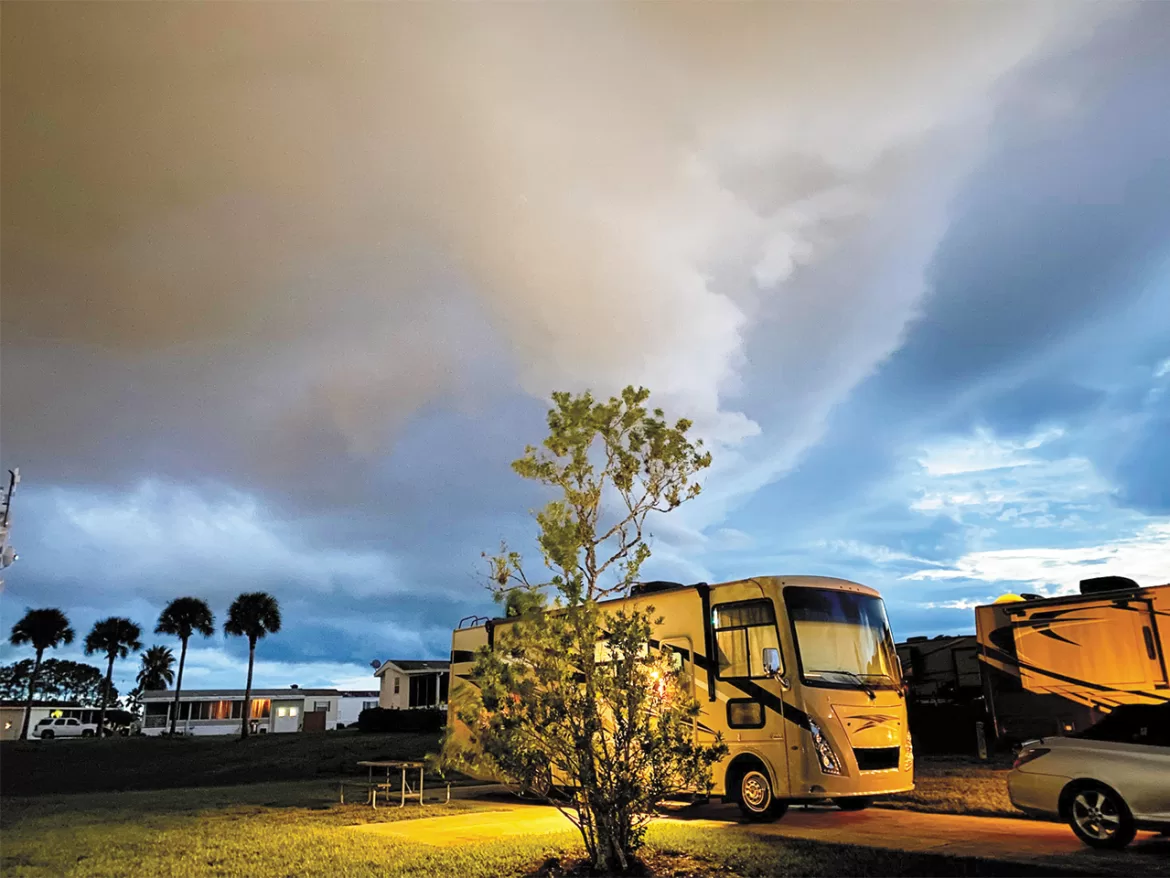Staying aware and having a plan will help you remain safe during your travels.
By Scott & Van Russell, F505257
May 2024
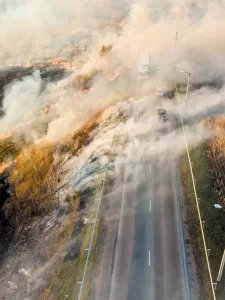 When you hit the road in an RV, you know you are signing up for an exciting adventure. As much as we all love the freedom and flexibility that comes with RVing, Mother Nature sometimes throws us a curveball, and it’s important to be prepared. In this guide, we’re going to equip you with the knowledge and strategies you need to stay safe and enjoy your travels, no matter what the skies may bring. So, buckle up, and let’s dive into weathering storms with confidence out on the road.
When you hit the road in an RV, you know you are signing up for an exciting adventure. As much as we all love the freedom and flexibility that comes with RVing, Mother Nature sometimes throws us a curveball, and it’s important to be prepared. In this guide, we’re going to equip you with the knowledge and strategies you need to stay safe and enjoy your travels, no matter what the skies may bring. So, buckle up, and let’s dive into weathering storms with confidence out on the road.
BEING PREPARED IS IMPORTANT
Before we get into the specific types of weather conditions you may experience while RV traveling and how to plan for them, let’s discuss why being in an RV during bad weather is different from being in a stationary house. You also may be wondering how often weather concerns really affect RV travel. Well, the longer and farther you travel in your RV, it becomes a matter of when, not if, you will experience bad weather.
While remaining safe in severe weather is important even in a sticks-and-bricks home, it’s especially crucial if you are driving when bad weather occurs, or if you are staying in an unfamiliar area where you may not know the proper precautions to take. Traveling to new places is exciting, but sometimes weather or fire risks exist in those areas that you aren’t used to experiencing where you live. Staying aware and having a plan will allow you to enjoy your travels safely wherever you roam.
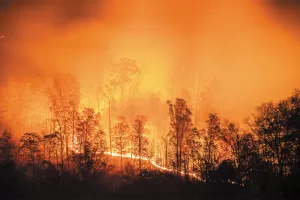
FIRES, FLOODS, AND SANDSTORMS, OH, MY!
Our family has been full-time RV traveling for almost nine years throughout the United States. We are from the Midwest, so we are very used to tornado safety, hail, wind, and flood concerns that commonly affect the middle portion of the country, especially in the spring and early summer months. As soon as we hit the road, we quickly realized how many different weather conditions exist in other parts of the country that we really didn’t know much about.
In fact, during our first two years out on the road, we experienced a sandstorm in Utah, a wildfire in Washington, and a flood evacuation in Florida. We found through experience that you need to stay aware of your surroundings and the weather forecast at all times, and being in an RV pales in comparison to the shelter of a building. Since the weather is just another part of traveling, let’s make a plan.
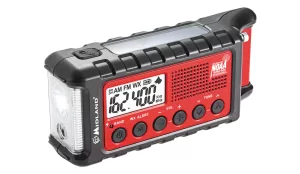
Have a portable weather radio on board.
EQUIPMENT YOU NEED TO STAY SAFE
The way to prepare for storms in an RV is to have tools that warn you of upcoming weather risks regardless of your location. When RVing, you may be without TV service or reliable internet. I can’t tell you how many times we have had zero TV antenna channels in our RV and very poor or no internet connection. If your connection is weak, it can become even worse in a storm. Consider solving this problem by going old-school and purchasing a weather radio. Choose a model that has a battery backup, and make it a habit to update your location in the radio as soon as you arrive in a new area. That way, you can stay vigilant regardless of where you are or the services available there.
Also, download a variety of weather, fire, and wind apps on your cellphone and set the app notifications to display warnings. Many people have weather apps, but unless the notification settings are correct, it’s easy to miss important information.
TORNADO SAFETY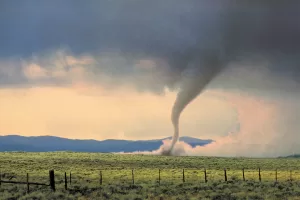
RVs and campgrounds are especially vulnerable places to be when severe winds occur. Why? RVs won’t offer protection during high-wind events such as tornadoes and hurricanes, and campgrounds often don’t have approved tornado shelters available.
Here are some steps you can take in advance to protect yourself. When you check into a campground, ask what county it is in and where the nearest tornado shelter is located. It also helps to know the names of surrounding counties. Write this information on your check-in paperwork and take a picture of it with your phone.
Keep this info in the same place in your RV every time you change campgrounds. We have it in a drawer close to our RV door. Another great option is to have a whiteboard on an RV cabinet that displays your current address and county for emergency purposes. That way, your family always knows your exact location in the event of a weather or other emergency.
It’s really important to note the difference between a tornado watch and a tornado warning. A watch simply means conditions are right for tornado formation in your area. In other words, keep an eye on the weather. A tornado warning in your county means to take shelter immediately, as a tornado is either radar-indicated or has been spotted. That is why knowing what county you are in and where to go in advance is so important. Never stay in your RV during a tornado.
WINDY CONDITIONS
What’s the big deal about wind? A lot, it turns out, when you are RVing. Storms such as tornadoes and hurricanes can flip an RV, or worse. An RV is not a safe place to be during dangerous wind conditions.
It’s also not safe to drive an RV in high winds. Watch for high-wind warnings and consider rescheduling RV travel days if the forecast shows dangerous winds. While mixed advice exists about wind speeds that are unsafe for RVing, most RVers, including us, agree that winds above 40 mph are a no-go for driving an RV. Crosswinds can cause an RV driver to lose control or the RV to flip in extreme conditions, so it is always better to be safe than sorry when it comes to the wind. We use the Windfinder app to track this.
Wind is also a significant factor in wildfires. Wildfires can be extremely unpredictable and spread quickly. Make sure to heed any local warnings in the area and to have an app that monitors wildfire locations. It’s better to evacuate just in case than to end up in a life-threatening fire situation. Plus, who wants to camp in heavy smoke and worry about the spread of fire anyway?
DON’T MESS WITH HURRICANES
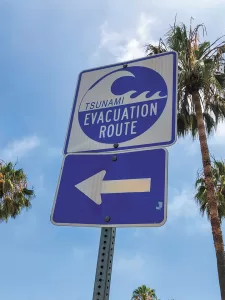
If the situation merits, RV owners should seek shelter or leave, especially when evacuation orders are issued.
Just don’t do it! That’s our best advice regarding RVing during a hurricane. We have been near a few different hurricanes while RV traveling in Florida, and it can be an unpredictable and scary experience. The forecasted path can change at the last minute, so we’ve found that it’s best to get as far away from the area as possible. If you can, evacuate early to try to avoid being stuck in long traffic jams. Make sure you have plenty of fuel and supplies in case you are caught in traffic.
If you aren’t able to evacuate, consider leaving the RV and taking your family to a hurricane shelter or a hotel to stay safe during the storm. Most campgrounds do not have an approved shelter, so you will need to find an alternative location. Hurricane areas often experience both power and water outages. Make sure you have enough nonperishable food and water supplies for your family. Also, pack an emergency bag with essentials like medications and important paperwork. With hurricanes, it’s always better to be safe than sorry. While RVs are replaceable, your precious family is not!
FLOODS CAN BE A HIDDEN DANGER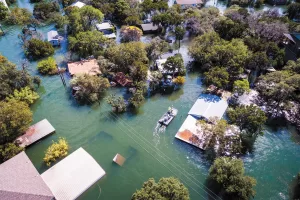
Floods are probably one of the most dangerous weather situations RVers may not see coming. If you have ever spent time out in the desert, you know that it takes very little rain to create a flash flood. In fact, sometimes it’s caused by rain that falls in a nearby location and flows down to your area, even though you never saw any rain at all.
It’s extremely important to choose your camping location wisely. Never park near a wash, a drainage ditch, or too close to a body of water in case it rises quickly. When camping on the beach, always know the scheduled tide height. King tides — a popular term for exceptionally high tides that sometimes occur — can create dangerous water levels and flood events. Make sure to take flood warnings seriously to stay safe while RVing.
Remember, your RV is vulnerable in ways that a traditional home is not. Always prioritize your safety and that of your loved ones over all else. By planning, staying informed, and knowing when to seek shelter or evacuate, you can ensure that your trip remains memorable for all the right reasons. With these tips and a little preparation, you can weather any storm and continue to enjoy the incredible experiences that RVing has to offer.
HELPFUL WEATHER APPS
The Weather Channel
AccuWeather
Clime: NOAA Weather Radar Live
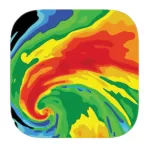
National Hurricane Center Data
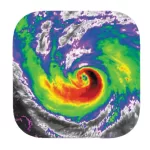
Watch Duty: Wildfire Map
Windfinder: Wind & Weather Map

Marine Weather Forecast Pro


